By: debbie lynn elias
With few exceptions, each of us has been affected by the financial collapse of America in 2008 and the resulting “Great Recession.” But how many of us actually understand “how” this could happen not only to America, but to each of us? We work hard, save a little, spend a little (or in some cases, save a lot, spend a lot). We go along in our daily lives like good worker bees as we’ve been taught by our parents and their parents, many of whom survived the Great Depression. But something broke within the system and there is now little to no saving or spending but for the top 1% of earners in the country and the inequality of earnings and wealth is at unprecedented levels of disparity. So, what happened?
This is exactly the kernel that was planted within director Jacob Kornbluth when he got the idea for a documentary on the subject tailored for the average American. And so Kornbluth went to Robert Reich. Considered to be one of the foremost experts on economic policy, former Secretary of Labor to President Clinton, cabinet member for Presidents Carter and Ford, author of 14 books and currently Professor of Public Policy/Wealth & Economics Berkeley, Robert Reich is the teacher, guide and hero in INEQUALITY FOR ALL; the teacher that we all wish we had had and thanks to documentarian Jacob Kornbluth, we now do have.
Together with two of my colleagues, I sat down with Robert Reich and Jake Kornbluth to talk about INEQUALITY FOR ALL, following which I spoke with Reich and Kornbluth exclusively. Given the intricacies of the issues and the intertwining themes, below is a consolidated and excerpted Q&A of my discussions with the gentlemen in both forums.
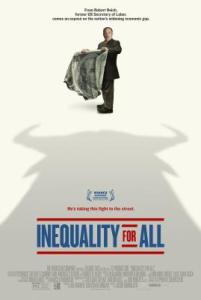
I applaud you on this film. This is the “Schoolhouse Rock” on the economy!
RR: I love it! That’s your headline.
The film is fantastic. So enlightening. You, Robert, really are a character in the film. You’re the teacher everybody should have had and the one everybody wanted.
JK: That’s how I felt. I had never seen [Reich’s] class, but when we started making the movie, I thought, “Man. This is a class I wish I could have taken in college from the teacher I wish I could have taken it from.” That’s when the classroom became part of the film. It wasn’t part of the movie in the initial conception.
I genuinely appreciate what you’ve done. INEQUALITY FOR ALL is so beneficial for the American people.
RR: That’s the idea, debbie. We’re really hoping this changes the national conversation and gives people more of a sense of their own power and efficacy and ultimately leads to political change and reverses these trends because they’re dangerous.
What was the genesis of this film? Even though this problem or issue has been onging and we’ve seen the economic decline of America over the years, what prompted the film?
RR: I have been writing about it. I have been trying to do something about it. I’ve been in Washington and I’ve been banging my head against the wall. One day Jake came into my office and wanted to do this film based on my most recent book. I was skeptical. Let’s put it gently; I was skeptical.
JK: I actually wanted to do the movie before I read the book. . .We had known each other a bit and I was interested in knowing what the story about the economy was for myself.
RR: We had done some 2 minutes videos.
JK: I had in my mind this sense that somebody without an economic background that I was a perfect first audience for this stuff. If I could get it, maybe everybody else could get it. I realized that in the bigger economy, I had been sort of trapped in the 24 hour news cycle. I kept hearing people discuss income and equality and what was happening to the economy after the crash in 2008 and I didn’t understand what was going on. I didn’t get it. I was frustrated with that. I understood that the democrats thought this and the Republicans thought that, but I didn’t understand what had happened. I didn’t have any context for it. So, I was hoping to do some sort of story to put all of this in context. And then his book was just like paradigm shifting for me. I hadn’t thought about it in that way. I didn’t realize that this widening income inequality was affecting our economy and our democracy. I had understood it maybe in moral terms coming into that. I had understood that maybe it just wasn’t fair that people had this amount and everybody else had that little, but now I had a new framework to understand it. It was bad for our economy overall and it was bad for our democracy.
And was this the Beyond Outrage book?
RR: Aftershock. Beyond Outrage was really a collection of essays so the last large book was Aftershock. I did try to summarize what I thought had happened to the economy over the past 30 years and how widening inequality had a roll to play in the financial crisis and we would still be struggling to get out of the gravitational pull of the Great Recession because of it. Jake did something that I didn’t think was possible and that was put it into terms in movie language and art form that, at least the audiences we’ve had at screenings, have found incredibly powerful.
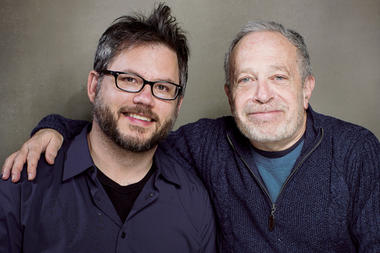
What made this the right time to make INEQUALITY FOR ALL?
JK: I don’t know. . . I really woke up to this around 2008; around when the economy crashed. What I realized was, like a lot of people of my generation, we’re pretty cynical about politics or we didn’t feel like we could participate. I had never really participated. I had just reached my personal limit. I had to get this and do something about it. I felt like I had to do something about it. In that way, I bet there are other people like me. I bet there’s people who to this point have not been invested in economics and politics and I’m hoping when they see the film they turn around. I think in a certain way, it’s not “just of this moment” this film. I feel like it’s not pinned to just one news cycle. I feel like it will be useful to people to see next year and it would have been interesting for them to see it last year. I feel like it’s one of those stories that’s a little bit bigger and a little bit less pinned to one time. I can see it useful in a bunch of different eras. . . A few years ago, I didn’t understand this stuff and I had never done anything political and I had never made a documentary before. But, this felt to me hugely important. Getting this message out, getting his story out, felt to me like there was nothing more important that I could think of to do. Now, the film opens and it has a shot. I’ve done something. My friends are like, ‘Boy, if Jake can do something then maybe I can, too!’ So, I’m hoping that this film does something to change that conversation and the way people think about it; and that people feel a little bit more empowered to do something about it.
RR: I think it’s also very important for people as we come out of the crisis that was the “financial crisis of 2008/2009″, it’s dawning on people that there’s something fundamentally wrong with the economy – I’m working harder than ever. I’m not getting ahead. We’re supposed to be in a recovery. This is not a recovery for me. I can see there are very few people at the top who are running off with most of the gains. – I think that if this movie had come out during the financial crisis, everybody would be focused on Wall Street and the financial crisis. I think now is the perfect time as we come out of the recession when the realization is dawning on people that there is something more fundamental going on that we can actually teach.
JK: That’s exactly what happened to me, what he just described. I had this sort of realization that maybe this isn’t right. Maybe there’s something wrong here. I felt like the partisan terms I was getting the message through wasn’t really teaching me anything. I wasn’t learning anything about – just because the Democrats feel this and the Republicans feel that, wasn’t really educating me on it.
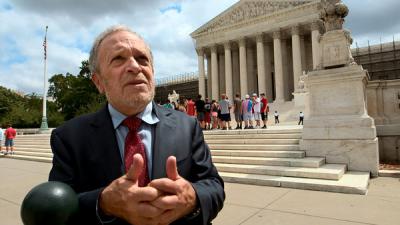
Through INEQUALITY FOR ALL we see that everything is connected. You’re not blaming Wall Street. You’re not blaming politicians. Everything is interlocking.
RR: It’s not a blame game. One of the things I tell my students is that if you want to understand what’s been going on and also what needs to be done, you’ve got to get out of the blame game. Some people on the left want to blame the rich and corporations. Some people on the right want to blame the poor and government. Either of those frames referenced get you nowhere. And they aren’t even truthful. You’ve got to understand the dynamic itself – How we got into the position? Why is it that globalization and technological change have not had nearly the same affects of pulling societies apart of creating massive inequality and economic insecurity elsewhere? It’s a failure of understanding that we can change the rules of the game and have a much more prosperous society overall. This is not a zero sum game in which the only way the middle class and the poor gain is if the rich lose. The rich will be better off with a smaller share of a rapidly growing economy and a less vitriolic society than they are now.
JK: What you just said about the dots connecting, how the dots connect in this film, is really where my framework got locked or where I felt it was a paradigm shifting idea for me. It wasn’t just one thing. It wasn’t just campaign finance reform needs to happen, although it does. And it wasn’t just Wall Street reform needs to happen, although it does. It’s that they’re all connected. For me, I have a feeling on a personal level that my community and society isn’t as cohesive as I want it to be. I’m not as connected to my fellow citizens. I’m a little bit too cynical about politics in general. When I started to see that all of these things are connected. . . to me, the biggest story of our time is this widening income inequality, this growing income inequality. It affects every aspect of my life on a daily basis in a way that I feel. I’m worried economically about the future. My parents generation had a little bit easier run of it than I’m having and me and my friends are having. I’m worried about politics being just so partisan that I feel like I’m beaten down by it. But what if all of those things are connected? What if the big story here is that the structure of the economy is organized in such a way that makes it so that it’s not for the good of our society; it’s not the best America we can build. I’m hoping that when people see this film they change this from a moral question of income and inequality and isn’t it just too bad to something like, if we want to have an America that sort of works for everybody and that’s good for us and good for all of our citizens , that we need to fix this. It’s an imperative that we do something about it, that we not get beaten down over it.
When it comes to the structure of the film and the information you chose to impart within that structure, how did you go about deciding what to talk about and then how to deliver it in such an affable and easily understood while authoritative form?
JK: Bob’s a great communicator and he can speak to that, but this process of figuring out which points to focus on and how – each one of the topics in the film are rabbit holes that I fell down for what felt like a month. I’d go down and I’d be like, “In the history of unions, what happened?”, and it turned out that we had to keep this larger picture in mind, the widening income inequality, and thank goodness that we had such a collaborative relationship to make this. We’d shoot part of the movie, I’d go back and edit it and come up with some story points and I’d would say, “Maybe we’d like to try it a little more this way” and we’d come back and ask [Reich] a few more questions about it.
RR: I wrote something we call “The Spine” which was the simplified narrative whole and Jake filmed me head-on, basically reading it. We had a teleprompter. And it didn’t work. It was too stiff. It wasn’t me. Although I think “The Spine” still had something to do with what we ended up with, part of Jake’s brilliance is just knowing what works and what doesn’t work.
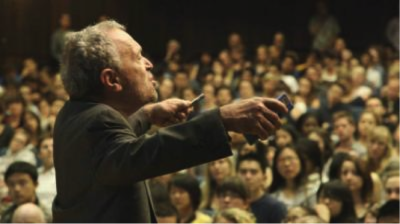
Everything goes hand-in-hand and falls into place; the editing, the final product is rapier. It’s to the point, it’s engaging, it’s informative, and you cannot turn away from it.
RR: I’m a broken record about this but I think Jake is a genius. I think he put together an amazing team. Kim Roberts the editor, the graphic designer Brian Oakes and Marco d’Ambrosio supplied the music. This is an amazing group of people under Jake’s orchestration.
JK: It’s true. I had never had such a gratifying collaborative experience in making anything. Not only working with Bob which was inspiring in its own way, but the filmmakers on this project – The editor, she had cut previously a film called FOOD, INC., that I had been a big fan of. And she had also made a film called DAUGHTER FROM DANANG that I was a fan of. She was brilliant. Miranda Yusef who did some editing, too, she was brilliant. The camera team and the producers Jen Chaiken and Sebastian Dungan; these people got together and they all brought everything they could to this project. You don’t usually see this. People are just in it for a job at some level but in this case it really felt like a passionate bunch of filmmakers all at the top of their game, working as hard as they could to do something they believed in. If you’re lucky, you get that work experience rarely in your life and some people never get it. I feel fortunate. The making of this film was an unbelievable project to be a part of.
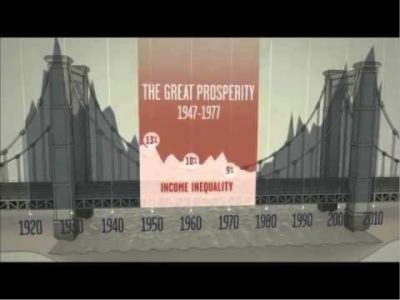
The way you interpose the graphic of “The Bridge” is an engaging tool. People love to look at things. They love visual aids. Brilliant concept because that image even a little kid can identify with.
RR: That was Jake’s idea.
JK: That was maybe an “a-ha” moment that made the movie come together. At the beginning of his book is this graph and it has 1928 and 2007 and it looked to me so clearly like a suspension bridge. I was like, “My goodness gracious. Is it really that clear? That just before the two biggest crashes of this century was the most concentrated income in the hands of the 1%?” When I saw that I had to know more. I knew that there was enough in there that was intriguing to me that I really wanted to sort of understand it more but it was the initial visual “aha” that made the movie make sense to me.
How in flux was the story where you were going with the film during shooting? Were things changing, was content changing, and did the changing economy or world events change the direction of the film?
RR: It was constantly in flux. It was not so much the economy because, unfortunately, I knew this was going to be an anemic recovery because of all of the reasons that the film suggests. Jake and I would get together and I‘d say, “How’s it going?” and he’d go, “I don’t know where we’re going.”
JK: I never knew what was happening. It’s terrifying to make a movie, any movie, but a movie like this even moreso. We had no idea where this thing was going. Day-to-day it would change and just until the very end, the movie has a whole lot of threads – his personal story, the classroom, the experience of the people, the subjects of the film, and the different sections of the movie. They just didn’t feel cohesive. It didn’t feel like one movie until it sort of all came together which was just at the very end. We had screenings two weeks before we submitted to Sundance and it still felt like we were flailing around. Then it was just sort of magic and it worked.
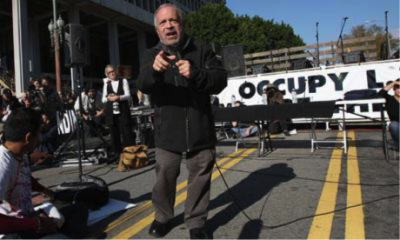
You mentioned cynicism. What was the moment where you overcame your cynicism? And what do you tell your students who come away from the class with a “what can I do to change things” attitude?
RR: Cynicism is the largest obstacle to social change. Part of the course, and even part of the movie, is historical. You’ve got to understand that we have been here before. The United States economy – We continue to save capitalism from its own excesses again and again. We did it in the Progressive Era between 1901 and 1916. We did it in the Great Depression, the New Deal of the 1930’s. We expanded opportunity, equal opportunity in the 1960’s. It’s a never ending challenge. The problem is the last 35 years, we as a country, have not been as vigilant as we need to be. So, it’s possible, we know it’s possible. Cynicism is dangerous because people throw up their hands and say, “It’s not possible. Why should I even try.” And that’s the end of the road.
JK: One of the interesting points that comes up around this topic is generational. Like Bob always says when we talk about this stuff, he says, when he was growing up he had examples of social change happening, playing out in front of his face. It was taken as sort of a given; the Robert Kennedy, the civil rights movement, the fight for the Viet Nam War. He lived through a bunch of things that he saw change happen when his generation put their foot to the floor. For me, I never saw that. I grew up in an entire period of feeling as though we weren’t really affecting change at all and that we were sort of losing our democracy, that we didn’t feel in control of it or that was certainly the experience of me and my friends. But, we talk about this, and making this movie certainly has been – actually I feel much more optimistic making it now than I did before I made the film. One of the things was make the film about income inequality and you’ll feel better about it. But the other thing is that there are these tipping points. There are these things when you feel as though you can’t see your way out of something. But as [Reich] said, if you look at it historically, whenever we get to those points where it feels like you can’t do anything about it, everybody rallies around and something happens. There’s a tipping point. There’s a change that sort of makes it so that everybody – and then it changes and it feels like it happens sometimes overnight; although I don’t like for anybody to think about this happening quickly. I like to think about it as a long fight. But I think that we could find it’s tipping point soon. We’re in an extreme right now. If we step out of the moment and our partisan fights, we see this economy and this democracy is dysfunctional because of how unequal the society has become and we have to do something about it.
Bob, you recently in another interview referred to yourself as a “vehicle” with this film, a vehicle to open people’s eyes and minds and educate them on some of these issues. So I ask Jake, how do you see yourself in this scenario?
JK: If he’s the vehicle then I’m the car mechanic. [laughing] . . . There’s two ways to answer the question. One of them is, we discuss going in. We both knew that we wanted to make a film about widening income inequality, and that’s the message and I felt like you needed to get to know the messenger to hear the message. We, against his will to a certain extent, had to open up his personal story as part of the film.
RR: This was a point of some, I wouldn’t say tension, but there was some difference of opinion because I have always been, even though I’ve been in government and I’ve been out there on the front line, I’ve get my personal life fairly private and aspects very private. But Jake convinced me that it was important to use my biography as a vehicle, again that word “vehicle”, for enabling people to connect with this subject.
JK: As far as the making of the film itself, it is true that he maybe didn’t know what he was getting into when he signed up for the film, but that allowed me a fair amount of time to study for myself and try to understand what he was saying which was the only way I could make a movie about it. It wasn’t clear to me what the history of taxes were, what effect taxes have on a society. That was a tremendous amount of work to understand each and every aspect of economics. I was shocked when I would pick up these books just how complex these topics were to wrap my head around. Then I’d go back and read his book and measure my understanding, because I’d try to have my own ideas and then measure them against what he had come up with. You’d see them boiled down and in a deep way, thoughtfully put together. It raised my admiration for his argument. But I had to in some ways come to peace with the argument for myself. I couldn’t just make a movie if it was his argument just putting it together. I had to understand it myself. I had to in some ways understand the story that I wanted to tell, understand his story and then see how the two things lined up together to make the movie. In terms of “vehicle” and being a “driver”, they were sort of parallel journeys. The 40 years of him talking about this issue and his work, and my personal journey in understanding what the movie is that I wanted to make for myself.
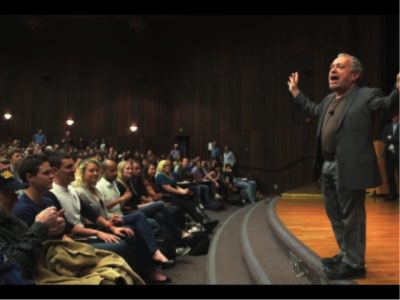
Switching gears a bit here, I think the timing of this film, especially right now and in light of what’s happening with Syria and the Middle East, is of even greater importance. United States history has traditionally been that war and military conflict seems to pop up as a means of “divert and deflect”. When the Syria situation exploded the other week, Obama made a public statement that he’s dropping everything to deal with Syria. What happened to the domestic front? We have the debt ceiling looming, we have other domestic issues looming.
RR: We’re going to be in the middle of huge fights.
I’d like the two of you to weigh in on this, and especially you, Bob. Do you think a film like INEQUALITY FOR ALL will draw some of the attention of the powers-that-be back to the homefront and get them back on track with the debt ceiling, with our financial issues, with the budget, as opposed to all the money that we’re going to lose and spend no matter what we do and what we’re currently doing relative to Syria and the Middle East?
RR: Washington is rarely a leading indicator in terms of social change. Occasionally it is, but most of the time change starts happening outside Washington. So over the next couple of months Washington is going to be immersed; if it’s not Syria, it’s going to be the debt ceiling or the continuing resolution of fights between Congressional Republicans and Democrats, between inside the Republican party, and the Affordable Care Act. It’s going to be just agony for the next month or two in Washington. I hope that even though it’s the usual maelstrom, the movie enables people to see the big picture and not be cynical, not be pulled down by the partisan bickering and maybe, eventually, that it could have an effect on the actors in Washington.
I would love to see that. I hope that INEQUALITY OF ALL can engage the public, bring them into the conversation and create enough public outcry to divert the attention back where it belongs.
JK: That’s maybe what a movie can do. If people start talking about it around the water cooler, it changes what people are talking about. That’s an important role to play. It’s important when you’re a filmmaker not to be too grandiose about the goals. You tell a story, you tell it was well as you can and at this point, the film’s not yours anymore. It’s the audiences’. I just hope people talk about it. I hope they go see it and talk about it. I hope in some ways it cuts through the partisan bickering over this topic and I hope, like you said, it gets some discussion, it helps people in some way, to focus some discussion on this topic. I think it’s one of the most important issues of our time.
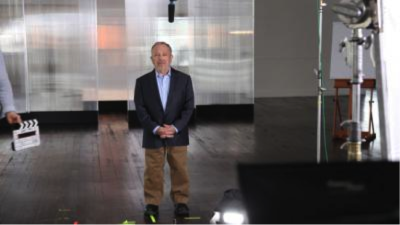
At the end of the day after making this film, now that you’re on this great journey with the release being imminent, what do you each personally take away from this project?
RR: Well, I knew nothing about film so I take away after having been a part of this project and been at a lot of screenings, just an awe about the power of film to tell a story in the hands of a great storyteller.
JK: For me, first of all, I find Bob’s personal story inspiring to me. The fact that he’s been fighting for 40 years and talking and teaching and going on television and doing whatever he can to do something about this for a long time. I think we all need to see examples of people trying to effectuate change to try and make it seem worth it for us. I talked about feeling a little bit cynical for much of my life about politics and I found this whole process to be, not necessarily that you achieve your goals, but that pursuing the goals is a worthy endeavor. I feel engaged. I want to go do what I can, to do my part, to do something about it. I don’t want to be too Pollyanna-ish about it or too idealistic in a way that seems naive, but I feel like, ‘What else am I gonna do?” It’s my country. I love America. . .You always kind of hope for the best. But I also want [my son] to know that I did what I could and that we all are doing what we can to make the world a better place.
And next for you both? I would love to see you take all the little pieces that you touch on with INEQUALITY FOR ALL – the judicial aspect, the legislative aspect, the different formulas and dynamics – and do a whole series for the History Channel or PBS or something! I just think it’s both interesting and fascinating the way the two of you present information. It’s something that every American relate to, from a 5th grader on up.
RR: A few years ago Jake and I did start working on these 2 minute, 2 ½ minute videos, on public issues. Jake suggested, I think it was, public option and the health care debate. Jake was confused about it. Other people were confused and Jake said, “Can we do a video?” and we did it. Some of those videos have gotten hundreds of thousands, there’s one that has 1.5 million, viewers. They’ve had a very big impact. Hopefully we’ll continue to do more and bigger.
###
9/17/13












